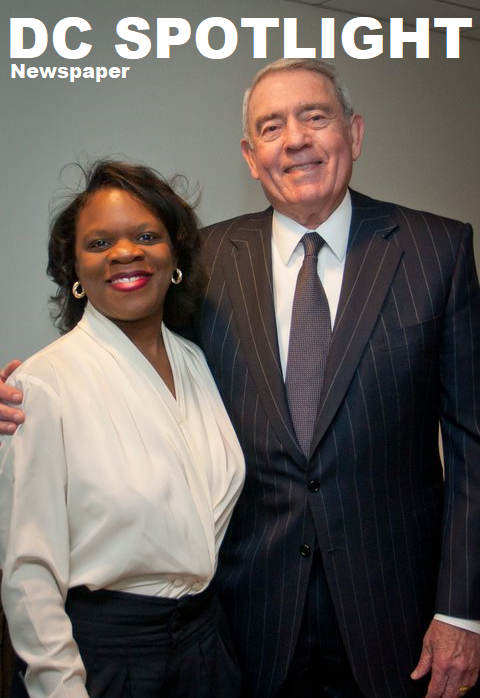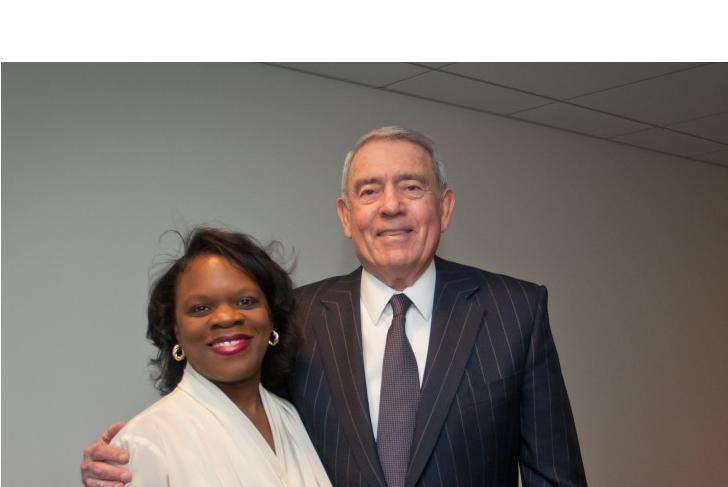Photo: Meredith Rizzo/DC Spotlight (Wendy Thompson and Dan Rather)
November 19, 2013 Republished from March 13, 2011
By Wendy Thompson
Editor
In the Spotlight with Wendy Thompson
“Of course, there are always things I could have done differently. I’m not sure they would have turned out differently, but there are all kinds of things I could have done differently. But Connie and I rarely had any difficulties whatever. We worked together five days a week, and it was rare that we had any difficulties, because we liked each other before she came to the anchor chair. At that time I had in my contract that I could approve or disapprove of whomever I wanted to work with and I approved her. We got along fine when she was doing it and when she left…things were okay…Yes, we’re friends.”
— Dan Rather, former “CBS Evening News” anchorman
Reflecting on memories of working with Connie Chung
On March 9, 1981, 30 years ago this month, the “most respected man in America,” Walter Cronkite, uttered a brief statement at the end of his reign as the “CBS Evening News” anchorman. “A great broadcaster and gentleman, Doug Edwards, preceded me in this job,” he said. “Another, Dan Rather, will follow.” Those simple words ushered in Dan Rather’s illustrious career at the powerhouse CBS network. Throughout the years, CBS has lost and restored its stature and top ranking among the networks, and Rather was always a part of the success. However, in recent years, that has not been the case. In fact, having succeeded Cronkite, the revered anchorman could not have imagined a more contentious and controversial ending to his storied career at the network.
 In March 2005, after his reporting of a “60 Minutes” presidential military story went awry, Rather resigned his post as the CBS anchorman and left the network that literary built his career in broadcasting. Les Moonves, CEO of CBS, made the parting statement: “Dan Rather has already apologized for the segment and taken responsibility for his part in the broadcast. He voluntarily moved to set a date to step down from the ‘CBS Evening News’ in March of 2005.” He added, “We believe any further action would not be appropriate.” “No!” says Rather, adamantly, when asked if it was his decision to leave the network. Sitting in the theater at the Newseum in Washington, D.C., he is unequivocal and clear about the facts of his departure from the network. “I reported an investigative story about then-President Bush’s military service. As a result of that,” he says, “I was asked to leave the anchor chair and eventually asked to leave CBS News.” His matter-of-fact manner reflects the bitterness the departure from the network evokes still today.
In March 2005, after his reporting of a “60 Minutes” presidential military story went awry, Rather resigned his post as the CBS anchorman and left the network that literary built his career in broadcasting. Les Moonves, CEO of CBS, made the parting statement: “Dan Rather has already apologized for the segment and taken responsibility for his part in the broadcast. He voluntarily moved to set a date to step down from the ‘CBS Evening News’ in March of 2005.” He added, “We believe any further action would not be appropriate.” “No!” says Rather, adamantly, when asked if it was his decision to leave the network. Sitting in the theater at the Newseum in Washington, D.C., he is unequivocal and clear about the facts of his departure from the network. “I reported an investigative story about then-President Bush’s military service. As a result of that,” he says, “I was asked to leave the anchor chair and eventually asked to leave CBS News.” His matter-of-fact manner reflects the bitterness the departure from the network evokes still today.
His termination prompted a $70 million lawsuit filed by Rather accusing CBS and its corporate executives of using the anchorman as a scapegoat during the fallout of the George W. Bush military story. In 2009, the lawsuit was dismissed by the courts. Yet, to his dismay, Rather was most affected by the lack of support by friends at CBS during his travails.
When Rather recalls the controversy surrounding the “60 Minutes” story on former President Bush’s service or purported lack of military service, it is the absence of support from his friends that weighs heavily on his mind in hindsight. Most notably, he remembers the absence of Mike Wallace, whom he had believed to be a close friend. When asked pointedly if Wallace had abandoned him, Rather confides in the affirmative. “Mike would have to speak for himself on his side, but I think that’s very fair to say…” says Rather. “I have spoken to him. Mike is not well at this moment, but I have spoken with him. I won’t to make this clear; I don’t want anybody to leave here with – My admiration of Mike Wallace knows no bounds. With the situation in which we found ourselves, having reported a true story, and the corporate part of the company did not think it was in their best advantage to keep us around. Again, I was surprised at some people whom I would have thought would have spoken up, if not in defense, at least to say, ‘I’m with you.’ But then on the other hand, I was surprised that people I barely knew or thought would not…did speak up. Each person has to make their own individual assessment.”
He understood early on that taking on men of power, particularly a sitting president, would be a heroic feat, but shuns any references to himself as a hero. “Hero’s too strong of a word,” he says. “I don’t know any journalists who are heroes.” It was during the heated presidential campaign and summer of 2004 that Rather and his team of producers uncovered what was thought to be Bush’s secret military records. On September 8, during CBS’s “60 Minutes Wednesday” program, Rather presented signed military records and reported on their authentication by experts and independent sources in the broadcast.
Weeks later, on September 20, CBS confirmed what conservative bloggers and reputable news organizations such as the Washington Post had ascertained. The records could not be and were not authenticated as reported. The fallout from the story was immense. “…In our own case, when we’ve taken on – if you will – the President of the United States, the pressure is tremendous, and it causes internal friction…that you might not have imagined would happen. And even at great institutions…when I was there…and long before I was there, the CBS News is, well, a national treasure, one of the great institutions of journalism, one of the two best in the world at news gathering. Of course, there’s a long tradition of …putting the story together. We stick together during the story, come out at the end together. But even with all that, when your story takes on the powerful, as you will see in this film [“The Insider”] the pressure is so great – that is to say – a lot of friction [is]inevitable…”
In the final analysis, the military documents currently remain questionable – never disproved or approved as authentic – with no conclusive answers as to their legitimacy; however, Rather and his producer, Mary Mapes, stand by their assertions that Bush received preferential treatment during his military service. They both contend that the documents leave unanswered questions and their inability to be 100% authenticated does not indicate that they were fakes. As a result, Mapes was fired along with other staff members directly and indirectly tied to the Bush story.
Of his firing, Rather lauds his journalistic integrity, but warns that in today’s world of big government and mega news organizations, integrity carries very little weight when a journalist is up against corporate giants. “It’s all well and good to talk about journalistic integrity,” he insists. “I talk about it; I try to live it. I’ve certainly made my mistakes with it…When you’re in the boardroom, which you’ll see in this movie (“The Insider”), in which the journalist – some of the best journalists in the world, not just in this country. They’re taken to the corporate headquarters…and they’re in a corporate boardroom, and a corporate attorney, who has millions of dollars at stake herself…and the corporation has hundreds of millions of dollars at stake. When you walk into that environment, you are aware – listen, you may be one of the best-known journalist in America, maybe one of the best-know in the world. You may be extremely well-paid. You may be the all-time, legendary executive producer making many millions of bucks a year. When you walk into that room, you’re a junior…Again, I ask you to put yourself in the shoes of the people. Perhaps you would have done better than the journalist in this film did…but don’t kid yourself, the power is there and no matter how big a star you are – star in quotation marks – no matter how much money you’re making in a corporation, if the corporate office you’re reporting to doesn’t like what you’re doing and goes in and tells the owner, ‘I think they’ve gone too far,’ you’ll lose your job. And the higher you go, the more afraid you get that you may lose that position.”
Today, Rather has moved on with his career to a new network, HDNet, as the managing editor and anchor at the television news magazine aptly titled, “Dan Rather Reports”. He travels regularly throughout the country and international as he continually seeks to find and report on compelling stories, but his job has gotten more difficult as the culture of news changes to fit a “cotton candy” news genre that was once respectable hard news. He watches the evening news programs occasionally when he is not traveling, but “when I’m home in time and when I’m in the country,” he says “I generally try to watch all three [CBS, NBC and ABC]. Sometimes I try to watch one one night and one the next night. Very often, I have the clicker in my hand. When one goes to commercial, I click to the other,” he says with a chuckle.
Having worked 43 illustrious years at CBS, the baton was passed to Katie Couric in September 2006, when she set a new standard for women as anchors of the evening news at one of the top three news networks. Diane Sawyer recently joined the anchoring ranks at “ABC Nightly News”, and Rather acknowledged his approval of the both saying, “Each one has a different approach to the job and by the way, this job varies from NBC to CBS to ABC. I think all three of the major anchors, Diane and Katie and Bryan, all three are experienced professionals…Each one has some strengths that the other two don’t have and vise-versa.”
Rather warns that news has increasingly become fodder for jokes about what is and is not real news. He laments the approach that large corporate networks have taken by giving viewers soft news, celebrity gossip and fluff, instead of news that is relevant and important. “The programs themselves are quite a bit different than they were even five or six years ago…The trivialization of the news, which is a trend that started probably 20 years ago, has now reached the climax of – as far as I’m concerned – the red light zone,” he remarks, scathingly. “The general pattern is to do what most people describe as hard news in the first 3-5 minutes of the broadcast and in the rest of the broadcast, by-and-large, is features of one thing or another. Everything from how to improve your health to how to get a better deal on a summer rental – those kinds of things. That’s a bit harsh, but only a bit…I have myself to blame, since I was on the watch some of the time. But this trend line increased and accelerated in recent years…It is a softening up of the news…There is a trend to go with what you think the audience is interested in and not with what is important,” he say.
Finally, Rather addresses the controversial and much ballyhooed co-anchoring he shared with Connie Chung from June 1993 – 1995. It was rumored that network executives forced him to share the anchor desk with Chung and that Rather orchestrated her firing years later. He vehemently denies rumors that there was a rift between the two of them; however, he does state that he would have handled the situation differently if given the chance to do it all again. “Of course, there are always things I could have done differently. I’m not sure they would have turned out differently, but there are all kinds of things I could have done differently. But Connie and I rarely had any difficulties whatever. We worked together five days a week, and it was rare that we had any difficulties, because we liked each other before she came to the anchor chair. At that time I had in my contract that I could approve or disapprove of whomever I wanted to work with and I approved her. We got along fine when she was doing it and when she left…things were okay.” Rather readily states that he maintains a friendship with Chung today. “Yes, yes,” he says “I saw her on the train not too long ago. She’s on the Board of Regents at the University of Maryland, and she was on the train coming up to the Board of Regents. I see her from time to time. Yes, we’re friends,” he says with a look of contentment and certainty on his face.
It was earlier in the interview, when I indicated that I had followed his career throughout my lifetime and that his career inspired me to become a journalist. At the end of the interview, Dan Rather, the former “CBS Evening News” anchorman and successor to Walter Cronkite replied, “I’m very happy to meet you, and I’m touched by what you said.”




